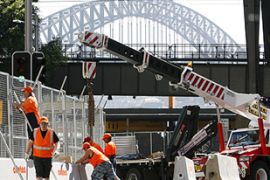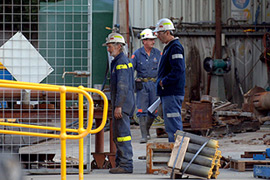Australia slashes migrant intake
Government announces 14 per cent cut in annual migrant intake as recession looms.

Announcing the changes, Chris Evans, Australia’s immigration minister, said the global financial crisis has changed the country’s economic circumstances.
As a result, he said, it would be “prudent to reduce this year’s migration intake accordingly”.
|
“We don’t want people coming in, competing with Australians for the same jobs when the jobs are in short supply” Chris Evans, |
“We don’t want people coming in, competing with Australians for the same jobs when the jobs are in short supply.”
Evans said further cuts were likely in the May 12 budget, leaving only health occupations, engineering and information technology as needed skills.
“What we’ll look to do is run a smaller programme and keep the capacity to make sure we can bring in any labour we might need as the year develops,” he added.
Following the announcement neighbouring New Zealand, which has been in recession for the past year, said it has no plans to follow suit and cut its annual intake of 45,000 skilled migrants.
“We have a skills deficit and while that may abate slightly because of the downturn in the economy and the growing unemployment, we still have to make sure we have enough skills to grow our economy and develop further,” John Key, the New Zealand prime minister, told reporters.
Rising unemployment
 |
| The global economic crisis is pushing Australia closer to recession [EPA] |
Last week the Australian Bureau of Statistics reported that unemployment had risen to 5.2 per cent, its highest in nearly four years.
The federal government predicts the rate will hit 5.5 per cent by June and says it could hit as high as seven per cent by the same time next year.
Australia had until recently seen a boom in new arrivals to help meet labour shortages for the past decade as a China-fuelled mining boom drove unemployment rates to 30-year lows.
But six of the country’s major trading partners are now in recession and its economic growth has stalled.
This month Australia moved a step closer to recession with the economy shrinking by 0.5 per cent, its first contraction in eight years.
The government hopes a recently announced $27.5bn stimulus package, including cash handouts and infrastructure spending, will help the economy through the downturn.
‘Combustible’
Bob Kinnaird, a leading migration expert and former government official, supported the move saying the record recent migrant arrivals in a fast-shrinking job market were leading to “highly combustible” conditions in regional areas, where most of them had settled.
The move was also supported by Australia’s Master Builders Association which was concerned about rising unemployment in the building and construction sector.
“We’re projecting at least a loss of 50,000 jobs in this industry over the next 12 months,” Wilhelm Harnisch, the association’s chief executive, told ABC radio.
Citing the prevailing economic situation opposition leader Malcolm Turnbull said the government should be prepared to further reduce the migrant intake.
“We’re disappointed they have failed to do so in recent months,” Turnbull told ABC radio.
But the Australian Chamber of Commerce and Industry took the side of caution saying the government needed to be wary of tinkering with immigration.
Peter Anderson, the chief executive of the chamber, said many skilled job sectors still faced a worker shortage and a cut in intake could crimp an economic recovery.
“We would have preferred a status quo position,” he added.